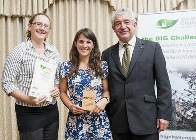IBERS research wins award for innovative design

BIG (Biodiversity Interest Group) Challenge winners: (Left to Right) Liz Morris, Director at Marine Ecological Solutions Ltd, Ally Evans, IBERS Aberystwyth University and Tony Juniper, environmentalist and BIG Challenge keynote speaker
17 October 2014
A research project led by the Institute of Biological, Environmental and Rural Sciences (IBERS) at Aberystwyth University has won a national industry award for incorporating biodiversity benefits into engineered developments.
The project, led by IBERS PhD student Ally Evans, is a collaborative effort between Ally, Dr Pippa Moore (IBERS), Dr Louise Firth (University of Southampton, previously Bangor University), Marine Ecological Solutions Ltd, Professor Steve Hawkins (University of Southampton), Gwynedd County Council, rock-drilling company SMS Wales, and KESS (Knowledge Economy Skills Scholarships).
The competition was run by CIRIA, a non-profit organisation that links science with the construction industry. Their BIG (Biodiversity Interest Group) Challenge called for developers to incorporate one biodiversity enhancement into each new development or construction site.
As part of her PhD looking at coastal defence structures as surrogate habitats for natural rocky shores, Ally and her project partners trialled artificial rockpools as a biodiversity enhancement in a granite breakwater at Tywyn, Gwynedd.
The rockpools have proven a great success, increasing the species diversity of the manmade habitat and supporting species of conservation importance. They are also equally diverse and productive as natural rockpools.
At a time when hard coastal defences are proliferating around our coasts in response to rising and stormier seas, interventions such as this are becoming essential to counter the considerable negative impacts to the natural environment.
Ally attended the awards ceremony at The Royal Botanical Gardens, Kew on Tuesday 14 October, accompanied by industry partner Liz Morris (Director at Marine Ecological Solutions Ltd.), to accept the award for “Most Innovative Design” on behalf of the project team.
The design, initially conceived by Dr Louise Firth, was praised for its simplicity and innovation, and the case study was also credited for having a post-construction monitoring plan and rigorous evidence base for measuring the success of the intervention.
Tony Juniper, leading environmental campaigner, gave a keynote, concluding that “these awards are going to shine a light on excellence that’s already out there and once we begin to show what’s possible we will gain momentum.”
Ally said, “We’re all overjoyed by the level of excitement surrounding our work amongst the construction industry. This has been a tremendous opportunity to raise the profile of our research and we’ve got lots of exciting possibilities for future work. We know that the way to get our ideas out there and implemented is to link into industry, so we’re really grateful to CIRIA for creating these valuable links”.
The research was funded by Marine Ecological Solutions Ltd. and KESS (Knowledge Economy Skills Scholarships). KESS is part-funded by the European Social Fund (ESF) through the European Union’s Convergence Programme, administered by the Welsh Government.



